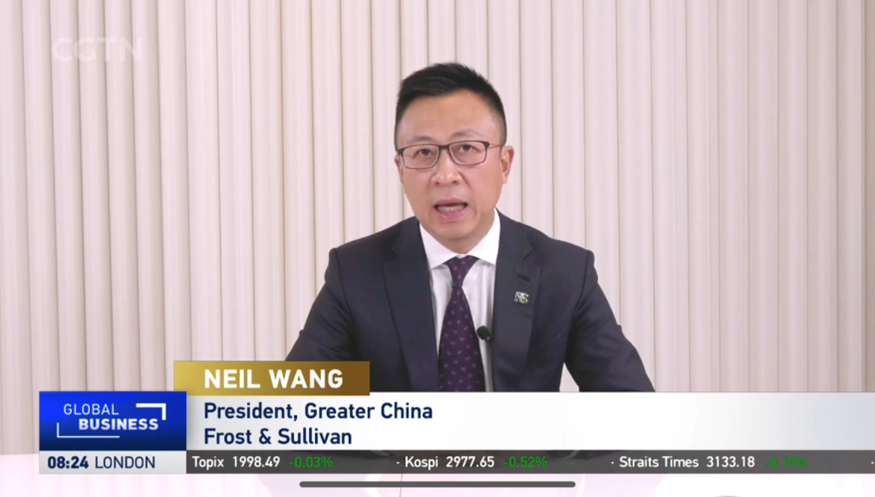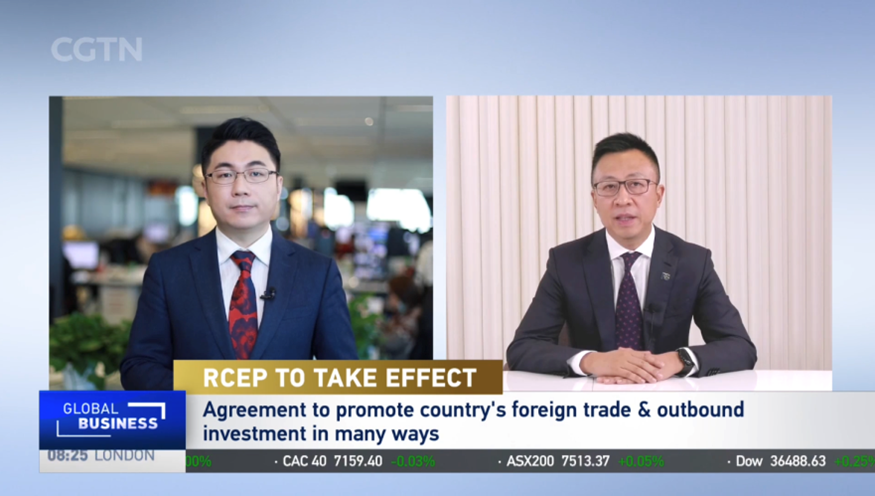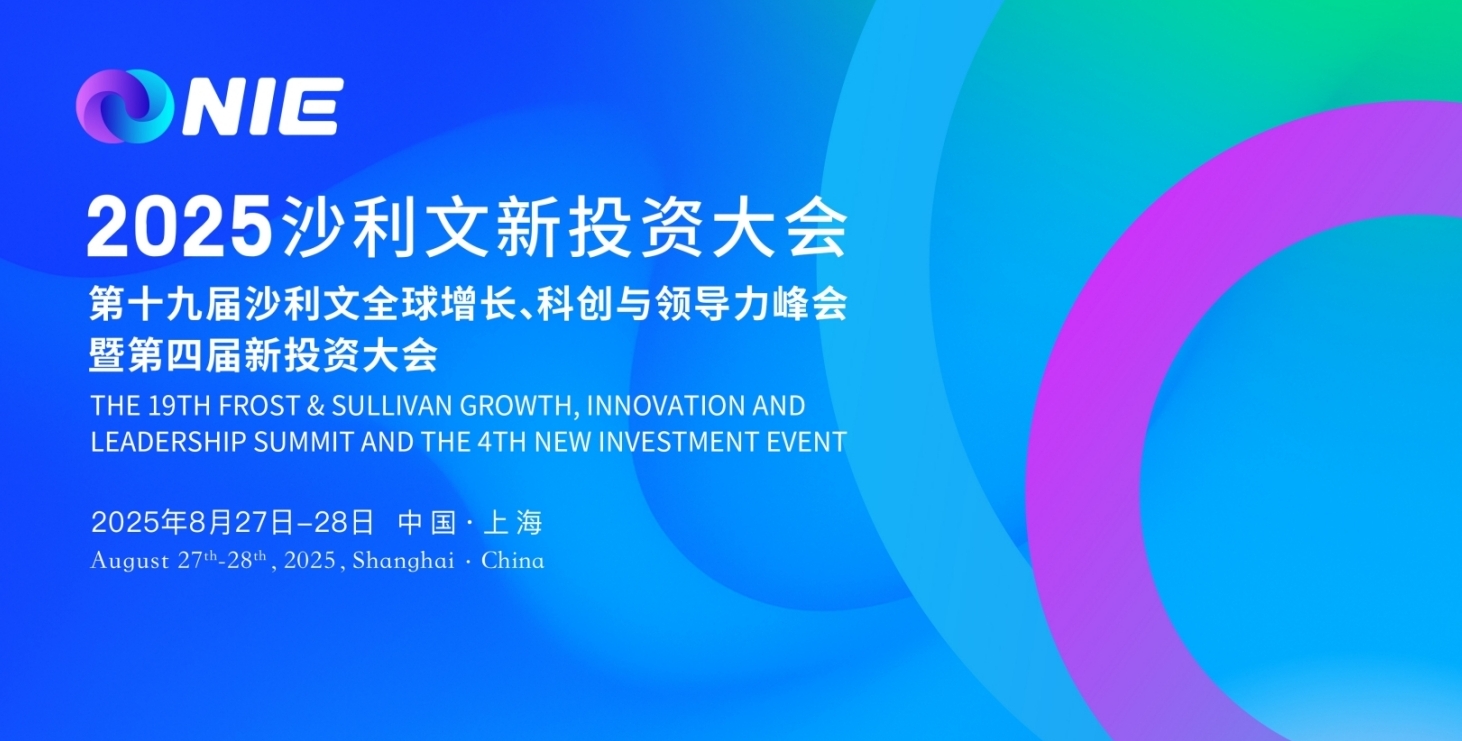据新华社报道,日前,国务院常务会议召开,确定跨周期调节措施,推动外贸稳定发展;部署做好《区域全面经济伙伴关系协定》(RCEP)生效后实施工作。会议指出,经过国际国内相关方共同努力,RCEP将于2022年1月1日正式生效实施。要支持企业抓住协定实施的契机,增强参与国际市场竞争力,进一步提升贸易和投资发展水平,倒逼国内产业升级。2021年12月23日,商务部发言人高峰在例行记者会上表示,目前RCEP国内实施的各项准备工作已经就绪。
如何解读中国正式加入RCEP?RCEP利好中国哪些产业?加入RCEP后,预测中国在全球产业链布局中的地位将发生哪些变化?RCEP对中国对外贸易有何影响?RCEP如何指导客户企业从降低关税中获益和找到新机遇?弗若斯特沙利文(Frost & Sullivan,简称“沙利文”)全球合伙人兼大中华区总裁王昕博士日前接受中国国际电视台《全球财经》(CGTN Global Business)栏目采访,分享对于中国加入RCEP的一系列看法。
Reporter: What is Frost & Sullivan’s interpretation of China’s accession to the RCEP on January 1st?
记者:沙利文对1月1日中国正式加入RCEP有何解读?
Dr. Neil Wang: Thank you for your question. There is no doubt that the RCEP is important for Asia's regional economic integration and will drive the global economy closely around Asia, Europe and North America. We believe that China's participation in the RCEP can promote China's international trade and outbound investment in many ways, utilizing the closed-loop value chain in the RCEP region to achieve technological advancement, market integration and industrial chain upgrade, reducing China's trade dependence on the U.S. and Europe, and helping to further elevate China's international status.
王昕博士:谢谢您的提问。无疑,RCEP对亚洲区域经济一体化有重要意义,并将推动全球经济紧密围绕亚洲、欧洲与北美展开。我们认为,中国加入RCEP可以从多方面促进我国国际贸易与对外投资,利用RCEP区域内价值链闭环实现技术升级、市场融合与产业链升级,减少中国对美国与欧洲的贸易依赖,有助于我国国际地位进一步提升。

Reporter: In your opinion, which industries in China will benefit from RCEP?
记者:在您看来, RCEP利好中国哪些产业?
Dr. Neil Wang: To promote the upgrading of China's high-end manufacturing industry and enhance China's position in the global supply chain.
王昕博士:推动中国高端制造业产业升级,提升中国在全球供应链中地位。
RCEP will help upgrade China's manufacturing industry, by improving the quality standards of Chinese products and driving higher quality development in China's economy. The RCEP agreement covers international trade and competition, market openness, intellectual property rights, e-commerce and other aspects, and from a perspective of investment protection, freedom, and convenience, it will have a systematic and comprehensive impact on our foreign trade and investment development. With the upgrade in China's industrial structure and the enhancement of mid-to-high-end manufacturing capabilities, China's manufacturing industry will gradually shift to high-tech, high value-added in the international division of labor. The RCEP will guide and refine the regional trade division of labor, which is conducive to the extension of China's industrial chain and the upgrading of its value chain.
RCEP将有助于中国制造业产业升级,提高中国产品的质量标准,推动中国经济的高质量发展。RCEP协定涵盖国际贸易与竞争、市场开放、知识产权、电子商务等多方面,将从投资保护、自由、便利性等角度对我对外贸易及投资发展产生系统性的综合影响。随着我国产业结构升级、中高端制造业实力提升,中国制造业将在国际分工中将逐渐向高科技、高附加值转移。RCEP 将引导并细化区域贸易分工,有利于中国产业链延伸与价值链提升。
Reporter: What changes do you expect to happen to China's position in the global industrial chain layout after joining the RCEP?
记者:加入RCEP后,您预测中国在全球产业链布局中的地位将发生哪些变化?
Dr. Neil Wang: China will leverage the benefits of the RCEP to promote regional economic integration and global economic and trade cooperation.
王昕博士:中国将借RCEP 之力,推进区域经济一体化和全球经贸合作。
The signing of the RCEP Agreement means that tariffs, tariff barriers and other trade restrictions of regional member countries will be significantly reduced; trade terms will be fair, reasonable and transparent, promoting rapid circulation of factors in the region, free and convenient trade and investment, and closer cooperation between industrial chains and supply chains, which is conducive to the further expansion of China's import and export trade, as well as promoting regional economic integration.
RCEP的签署意味着区域内各成员国关税、关税壁垒与其他贸易限制将大幅降低;贸易条款将更加的公平、合理与透明,推动区域内要素流通迅速、贸易投资自由便利,产业链与供应链合作更加紧密,有利于我国进一步扩大进出口贸易,推动区域经济一体化。
Among the 15 RCEP countries, China is the absolute leader in terms of population and GDP, therefore, China is in a key position in the value chain cooperation in the entire RCEP region. China has developed a technological lead, and with the labor advantage of ASEAN countries and the natural resources of Australia and New Zealand, a China-led "factory of the world" is being formed at an accelerated pace. Multinational companies will prefer to locate their industrial chains in the RCEP region, and China's important position in the global industrial chain pattern will be further consolidated.
在RCEP 15国之中,中国在人口及GDP方面绝对领先,因此在整个RCEP区域中的价值链合作上,中国处于关键地位。中国在技术上已经形成领先优势,借助东盟国家的劳动力优势与新澳的自然资源,以中国主导的“世界工厂”正在加速形成。跨国公司更偏向于将产业链布局在RCEP区域,中国在全球产业链格局中的重要地位将进一步巩固。

Reporter: What are the impacts that foreign trade has brought to China?
记者:RCEP对中国对外贸易有何影响?
Dr. Neil Wang: From the perspective of foreign relations, the RCEP is conducive to promoting economic and trade cooperation among China, Japan and South Korea, easing trade tensions between China and the US, and reducing dependence on the US.
王昕博士:从对外关系角度出发看,RCEP协定有利于促进中日韩经贸合作,缓解中美贸易摩擦、减少对美依赖。
Among the 15 countries of RCEP, China, Japan, and South Korea account for approximately 80% of the total economic value, and the cooperation among the three countries is expected to be further improved under the framework of the agreement. Firstly, the RCEP is the first Free Trade Agreement amongst China, Japan, and South Korea. In the past decade, the overall trade volume of the three countries fluctuated due to the trade frictions between China and the US. The signing of the RCEP agreement is conducive to promoting smoother and steadier trade between China, Japan, and South Korea. Secondly, the increase in trade cooperation among the three countries will assist China’s trade diversion. While stimulating China’s trade and economic growth, the cooperation may reduce China’s dependency on the US market , making China more proactive and favorable in the Sino-US trading relations to compensate for the reduction in China’s foreign trade caused by the friction between the US and China.
在RCEP 15国中,中、日、韩三国经济总量约占80%,在协约的框架下,三个国家之间的合作有望进一步加深。首先,RCEP是中、日、韩三国间首次达成自贸协定。近十年来,受中美贸易摩擦影响,三个国家整体贸易额波动较大。RCEP协定的签署有利于推动中日韩贸易更加顺畅与平稳。其次,中、日、韩三国贸易合作增加将协助我国外贸易转移,在促进中国贸易与经济增长同时,可帮助中国减少对美国市场的依赖,有助于我国在中美贸易关系中获得更多主动权,弥补中美贸易摩擦所造成的中国对外贸易的减少。
Overall, I believe that the RCEP can make China’s existing international supply chain more stable and improve China’s ability to withstand risks that will bring positive effects on China’s economic development, security, and stability. At the same time, the RCEP will effectively empower the development of intra-Asia trade collaboration when each member country can give full play to its own advantages in factors of production. By adjusting the layout of foreign trade and investment and optimizing resource allocation, the member countries will strengthen the critical position of east Asia in the global economy. Thank you.
总体而言,我们认为,通过RCEP,能够使中国现有的国际供应链合作更加稳固,提高自身抵御风险的能力,进而对我国经济发展、安全稳定带来积极效果。同时,RCEP将有效赋能亚洲区内贸易协作发展,各个协约国可以充分发挥自身生产要素优势,通过调整对外贸易和投资布局,优化资源配置,提升东亚经济体在全球经济中的关键地位。谢谢。

Reporter: Thank you very much, Dr. Neil. You have just provided a comprehensive and in-depth explanation from a macro perspective. In fact, we are also very interested in the benefits of RCEP for the development of Chinese companies. May you please discuss on “how may RCEP guide our corporate clients to benefit and explore new opportunities from tariff reduction”?
记者:非常感谢王博士,刚才您从宏观角度进行了全面且深入的解读;事实上,我们也非常关心RCEP对中国企业发展有哪些益处,能请您再就“RCEP如何指导客户企业从降低关税中获益和找到新机遇”着重谈一下吗?
Dr. Neil Wang: The RCEP “tariff-free” will bring huge development opportunities for Chinese enterprises in various industries.
王昕博士:RCEP“零关税”将为中国各行业企业带来巨大发展机遇。
The RCEP “tariff-free” refers to the eventual achievement of zero-tariff on more than 90% of the goods traded in the RCEP region once the agreement comes into effect, with immediate zero tariff on some goods or achieving zero tariff for other ones within ten years. The introduction of this policy means that the member countries will liberalize trading of goods in a short period of time. This enables beneficiary enterprises to significantly reduce production and investment costs, expanding markets and improve competitiveness globally.
RCEP“零关税”是指协定生效后,区域内90%以上的货物贸易将最终实现零关税,部分货物立即降至零关税,另一部分也将在十年内降至零关税。这一政策的出台意味着各协约国将在较短时间内实现货物贸易自由化,这将有助于我国企业的生产和投资成本大幅减少,扩大市场空间,提升企业的国际竞争力。
In terms of import, “tariff-free” helps enterprises expand the procurement scale of raw materials, automotive, electronic and other components at much lower costs, better meeting the domestic market demands for consumer upgrading, cost reduction, efficiency improvement for enterprises, and supply chain optimization.
从进口端来看,“零关税”有助于企业以更低的成本扩大对原材料、汽车零部件、电子元器件等零部件的采购规模,更好地满足国内市场消费升级需求,为企业降本增效,优化供应链生态。
Regarding exports, the “tariff-free” policy will significantly reduce product prices, promoting much more Chinese products to be marketed internationally, removing many challenges of enterprises in the international markets. Especially for products with export advantages, “tariff-free” will enable Chinese enterprises to enhance their competitiveness in the global market and replace the market shares of non-member countries resulting in further export expansion.
从出口端来看,“零关税”政策将显著降低产品价格,推动更多中国产品走向国际市场,消除企业在国际市场上的诸多挑战。尤其对于具有出口优势的产品,“零关税”将使中国企业增强在全球市场的竞争力,取代非成员国的市场份额,进一步扩大出口。
In addition, the RCEP cumulative rules of origin are of great benefits for exports of small- and medium- enterprises. It stipulates that when goods are exported to any RCEP member country, all intermediate goods and accessories from any RCEP country can be calculated into the value addition percentage of the origin to meet the requirements of regional value contents of 40%. Businesses will then find it easier to have their products meet RCEP origin requirements that may enhance the flexibility and autonomy industry chain layout. Therefore, “tariff-free” will bring optimization of supply chain, enhancement of market discourse, and expansion of global influence for Chinese enterprises with broader space for development.
另外,RCEP原产地累积规则对中小企业出口大有裨益,它规定商品出口到任意RCEP成员国时,来自RCEP任何国家的中间品、零配件都能计入原产地增值比例,来满足最终出口产品增值40%的原产地标准,这大大降低了企业的享惠门槛,增强产业链布局的灵活自主性。因此,“零关税”企业对我国企业优化供应链、增强市场话语权、扩大全球影响力带来了广阔发展空间。



